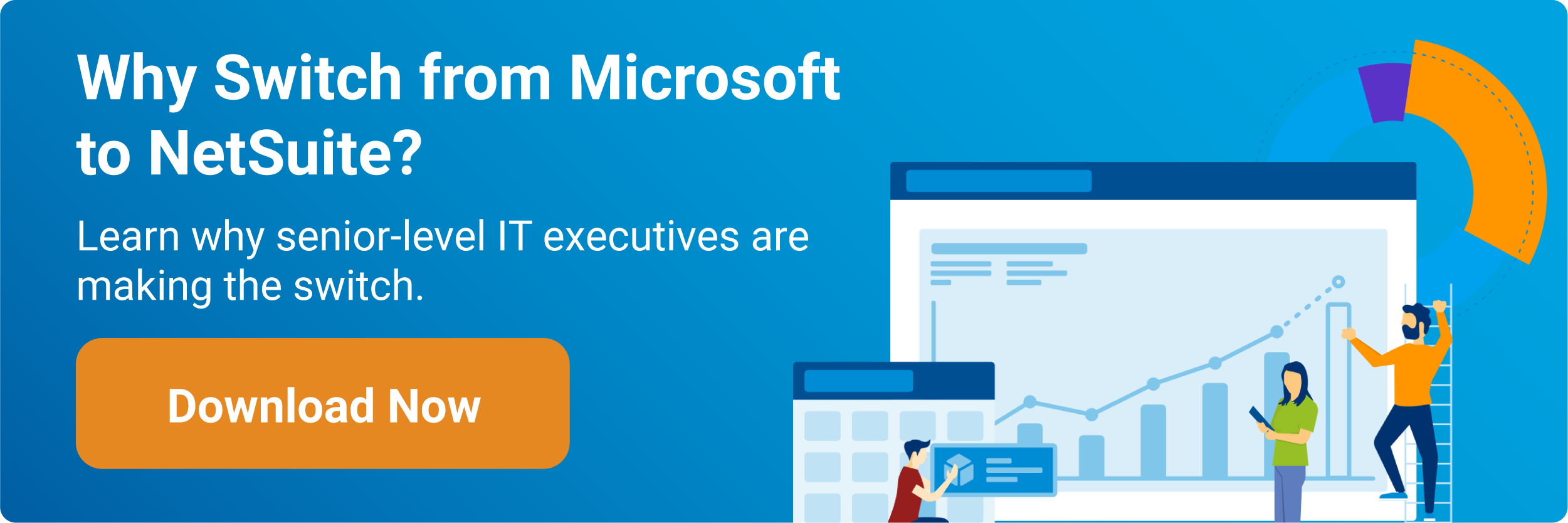
Preceding and following the release of any new business-centric technology, a host of myths can become unleashed and cause uncertainty and hesitation around implementing a much-needed product. However, they tend to be unfounded or specific to an individual business’s needs. Exposing these NetSuite myths will help to eliminate that unnecessary anxiety. Here are some of the most popular falsities surrounding NetSuite—the world’s leading cloud ERP solution.
Myth #1: NetSuite is No Different from Any Other Cloud ERP
The beauty of NetSuite is that it caters to businesses of all sizes and in all industries. While that might make it sound pretty generic, that couldn’t be farther from the truth. Think of NetSuite as a “jack of all trades” business management software.
While its original function was specific to finance, it has evolved into an all-in-one business management tool capable of handling most of its operations—from accounting to inventory, CRM to e-commerce, and beyond.
Myth #2: NetSuite Can’t Be Customized
Many professionals mistakenly believe that cloud-based applications are not customizable. While that may be the case for some solutions, NetSuite can be customized to meet nearly any business need.
NetSuite allows you to customize your instance, integrate third-party applications, or develop new solutions when necessary. Plus, all customizations carry forward (read: don’t break) with the platform’s bi-annual automatic updates. Plus, NetSuite scales with you as your business grows—without the pains and costs of investing in new hardware and servers. What’s inflexible about that?
CIOReview.com says it best: “NetSuite is a platform to do business on and not an out-of-the-box solution for transaction processing. While it has all the transactions you would expect, Sales Orders, Invoices, Vendor, and Bills, it’s the flexibility of how you use those transactions in your business process that makes NetSuite such a powerful product.”
Unlike legacy on-premise solutions, customizations don’t hinder upgrades, so your solution grows as your business does.
Myth #3: NetSuite is Outdated
You must be thinking of another software. NetSuite continues to be the leading cloud ERP solution for businesses worldwide due to its remarkable upgrade schedule. Because it’s a “true cloud” solution, NetSuite upgrades all accounts twice a year. This way, customers benefit from being on the latest release to use the latest technologies and capabilities to help drive their businesses forward.
Myth #4: NetSuite is Too Expensive
The cost of NetSuite is 100% dependent on the number of users, requirements, add-ons, contract length, and more. Therefore, the price varies from business to business. However, NetSuite automates your business’s processes for alignment across departments, thus increasing productivity and ROI in the long term.
The fact is, businesses of all sizes, even small and medium-sized businesses are perfect candidates for cloud ERP. Many businesses do not have the resources to invest in the massive infrastructure that on-premise ERP software solutions require—storage, servers, facilities, security, IT staff, etc. Modern cloud-based ERP solutions don’t need any infrastructure to run except, of course, an internet connection and a connected device. The cloud evens the playing field by significantly reducing that initial investment for ERP implementation.
For example, the cost of NetSuite—the world’s leading cloud-based ERP—isn’t a one-size-fits-all model; its price is tailored to each customer and depends on specific needs, including the number of users, requirements, add-ons, contract length, and more.
Are you looking for a number? Build a custom demo to find out what your NetSuite investment would be.
Myth #5: NetSuite is Too Complex
Some business leaders believe that cloud-based ERP platforms like NetSuite add a layer of complexity to how users access applications and execute business processes. In actuality, NetSuite helps to simplify operations with its consistency and mobility. NetSuite allows for anywhere, anytime access, making it easy to access the single platform employees need to accomplish their tasks. Plus, when it comes to infrastructure, there’s no complexity there. All that’s required to run NetSuite is an internet connection and a connected device—significantly reducing the investment (and management) typically required for on-premise ERP implementations.
Myth #6: NetSuite Will Own My Data
NetSuite’s official Terms of Service states that “all title and intellectual property rights in and to the Customer Data is owned exclusively by Customer.” Nothing to worry about there!
For those worried about secure transmissions, NetSuite ensures the security of communications between authorized users and the data center; cloud providers use the latest network security protocols. These include, but are not limited to, the most current Transport Layer Security (TLS), Secure Socket Layer (SSL) protocols, VeriSign certifications, and RSA public keys. All communications are encrypted before transmission, making it extremely unlikely that anyone would intercept usable data from the network itself.
For example, NetSuite’s operational security boasts SOC 1, SOC 2, PCI-DSS, and EU-US Privacy Shield framework compliance. In addition, NetSuite has modeled its security and risk management processes according to the National Institute of Standards and Technology (NIST) and ISO 27000 series of standards.
Myth #7: My Business is Too Big for NetSuite
Did you know that 20% of the Fortune 100 use NetSuite? While NetSuite remains an ideal solution for small and medium-sized businesses, it was built to scale as a company grows. That means that it will see you through your season of growth—and beyond—with Netsuite for Enterprises.
Does your company have (or plan to have) an international presence? No problem. NetSuite OneWorld supports multiple currencies, taxation rules, and reporting requirements across geographies and subsidiaries while providing real-time financial consolidation and visibility.
Bottom line? You won’t outgrow NetSuite.
Myth #8: NetSuite Isn’t Secure
To ensure communications security between authorized users and the data center, cloud providers use the latest network security protocols. These include, but are not limited to, the most current Transport Layer Security (TLS), Secure Socket Layer (SSL) protocols, VeriSign certifications, and RSA public keys. All communications are encrypted before transmission, making it extremely unlikely that anyone would intercept usable data from the network itself.
For example, NetSuite’s operational security boasts SOC 1, SOC 2, PCI-DSS, and EU-US Privacy Shield framework compliance. In addition, NetSuite has modeled its security and risk management processes according to the National Institute of Standards and Technology (NIST) and ISO 27000 series of standards.
Research has shown that cloud providers generally have a higher level of security than most other companies. When it comes to NetSuite, their data center is certified by the highest-level security protocols, including SOC 1 Type II, SOC 2 Type II, PCI DSS, EU-US Privacy Shield, and ISO 27001. Other operational safeguards include continuous monitoring, employee background checks, physical security measures, and regular performance audits.
From a user perspective, NetSuite provides peace of mind to administrators and business leaders with role-based access, idle time-outs, 256-bit encryption, application-only access, strong password policies, and more.
Myth #9: Private Clouds Trump Public
While not NetSuite specific and dependent on your particular needs, private clouds lack some of the more sought-after benefits of public clouds, including scalability and shifting software expenses from CapEx to OpEx. This shift allows organizations to pay for the solutions they need and doesn’t lock them down to a costly investment.
Every year, more and more companies make the switch to the cloud—but there are still some that are reluctant to put all of their company and customer data in the hands of a third-party vendor. Cloud security is typically the primary reason for their reluctance for those companies. It’s essential to ensure that cautious reluctance doesn’t turn into paralysis. There are many benefits to cloud computing, and a business shouldn’t abandon those benefits due to exaggerated concerns about cloud security.
Want to learn more about how a modern cloud app platform can drastically improve your business’s performance? Schedule a custom NetSuite demo today.




